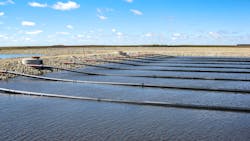EPA releases Lagoon Wastewater Treatment Action Plan
The U.S. Environmental Protection Agency (EPA) announced that it has released its Lagoon Wastewater Treatment Action Plan and awarded almost $2 million in research grant funding to support alternative wastewater treatment technologies in lagoon and pond systems.
“Many small and rural communities in the United States rely on a wastewater treatment process that falls short of environmental and public health protection,” says EPA Assistant Administrator for Water Radhika Fox. “The Lagoon Action Plan will help communities with lagoon systems ensure their local water quality isn’t impacted by improper wastewater management.”
Lagoon wastewater treatment systems are a common form of decentralized wastewater treatment that uses earthen ponds to break down wastewater using natural biological processes. These systems are particularly attractive to small or rural communities because of their low operating cost, built-in solids storage, and low minimal operating requirements.
The Lagoon Action Plan outlines actions that EPA will implement through 2026 to assist rural, small, and Tribal communities with lagoon wastewater treatment systems. The plan will identify how many lagoon wastewater treatment systems are in the United States; provide financial and technical assistance tools – including tools to help underserved communities access Bipartisan Infrastructure Law funding; develop cost and performance data for technologies, regulatory support tools, and plans for community engagement, communication, and partnerships.
Research Grant Funding
EPA is also awarding $2 million to research and provide information that can help small communities deploy demonstrated innovative water technologies for lagoon systems, which will help achieve better nutrient management in a cost-effective manner.
“Lagoon wastewater systems are essential to many small, rural, and Tribal communities,” says Chris Frey, Assistant Administrator for EPA’s Office of Research and Development. “EPA is funding this research to help improve water quality and better serve these communities.”
The following universities will be receiving an award:
- Michigan Technological University, of Houghton, Mich., is receiving $998,293 for its project “Innovative Water Technologies for Lagoon Wastewater Systems in Small Communities.” The project will deploy and test a floating treatment wetland system in a lagoon in a small community in northern Michigan.
- West Virginia University, of Morgantown W.Va., is receiving a $1 million grant for its project “Sustainable Nutrient Removal Opportunities for Small Communities with Lagoon Wastewater Systems.” The project will evaluate current and potential technology options to remove nutrients from lagoons systems and use this information to develop a decision-support tool that can be used to determine cost-effective technologies that can improve nutrient removal in lagoon systems in small communities.
